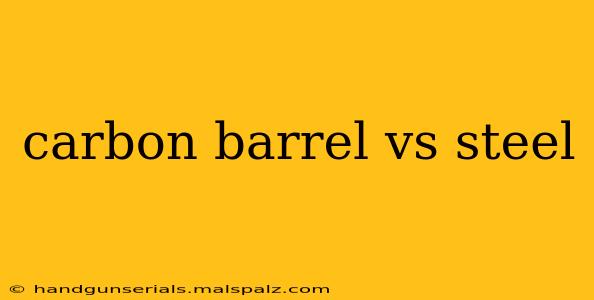Choosing the right barrel for your firearm is a crucial decision impacting accuracy, longevity, and overall shooting experience. Two popular choices often top the list: carbon steel and steel barrels. While both are steel, the differences in composition and manufacturing processes lead to distinct performance characteristics. This in-depth comparison will clarify the advantages and disadvantages of each, helping you make an informed choice.
Understanding the Differences: Carbon Steel vs. Steel
The term "steel" is broad. It encompasses a vast range of alloys based on iron and carbon. When we discuss "steel barrels" in the firearms context, we often implicitly mean various types of alloy steel, like chrome-moly steel (4140, 4150), which are known for their strength and durability. "Carbon steel barrels," while technically also steel, usually refer to barrels made from lower-alloy or even plain carbon steel, often with less stringent manufacturing processes.
Carbon Steel Barrels: Budget-Friendly but with Compromises
Advantages:
- Cost-Effective: Carbon steel barrels are generally less expensive to manufacture, leading to lower prices for the consumer. This makes them an attractive option for budget-conscious shooters.
- Readily Available: Due to their widespread use and simpler manufacturing, carbon steel barrels are more readily available in the market.
Disadvantages:
- Lower Durability: Compared to higher-alloy steels, carbon steel is less resistant to wear and tear. This means it may show signs of erosion or pitting faster, particularly with high-volume shooting.
- Less Consistent Accuracy: The manufacturing process for carbon steel barrels is sometimes less precise, potentially leading to inconsistencies in bore dimensions and overall accuracy.
- Susceptibility to Rust: Carbon steel is more prone to rust and corrosion if not properly maintained. Regular cleaning and lubrication are essential.
Steel Barrels (Alloy Steels): Premium Performance and Longevity
Advantages:
- Superior Strength and Durability: Alloy steels like chrome-moly are significantly stronger and more resistant to wear than carbon steel. They can withstand higher pressures and maintain accuracy over longer periods.
- Enhanced Accuracy: The tighter tolerances and more precise manufacturing processes employed with alloy steel barrels often result in superior accuracy and consistency.
- Better Corrosion Resistance: Many alloy steels offer better corrosion resistance than plain carbon steel, requiring less frequent maintenance.
Disadvantages:
- Higher Cost: The superior materials and manufacturing techniques involved make alloy steel barrels more expensive.
- Potentially Longer Lead Times: Depending on demand and availability, alloy steel barrels might have longer lead times compared to carbon steel options.
Key Considerations for Your Choice
Your decision between a carbon steel and a steel (alloy steel) barrel should be based on your individual needs and priorities.
- Shooting Frequency and Intensity: If you're a casual shooter, a carbon steel barrel might suffice. However, for frequent or high-volume shooting, an alloy steel barrel's superior durability is a worthwhile investment.
- Accuracy Requirements: For precision shooting applications, where accuracy is paramount, an alloy steel barrel is highly recommended.
- Budget: Carbon steel barrels offer a more budget-friendly solution, but remember, you often get what you pay for.
Conclusion: Making the Right Choice
The "best" barrel type ultimately depends on your specific requirements. Carbon steel barrels are a viable option for casual shooters on a budget, while alloy steel barrels offer superior performance, durability, and accuracy for serious enthusiasts and competitive shooters. Carefully weigh the pros and cons, consider your shooting habits, and choose the barrel that best fits your needs and budget. Remember to always consult with a qualified gunsmith for personalized advice.

